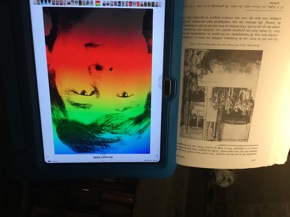29468YD The New Human Agenda: Invisible Armadas ed
Q
AFTER FAMINE,
HUMANITY'S SECOND GREAT
enemy was plagues & Infectious
Diseases! Bustling cities linked by
a ceaseless stream of merchants, officials
& pilgrims were both the bedrock of human civilisation
& an ideal breeding ground for pathogens? People consequently
lìved théir líves in ancient ATHENS or medieval FLORENCE knówing
that also THEY mìght Fàll ÌLL & díe nèxt wéék, òr that an epidemic might suddenly
erupt ànd destroy their entire family in òne swóóp! The most famous such outbreak,
the so-called BLACK DEATH, began in the 1330's, somewhat in east and/or central Asia,
when the flea-dwelling bacterium YERSINIA PESTIS started infecting humans bitten by the fleas!
From there, riding an army of rats & fleas, the plague quickly spread àll óver ASIA, EUROPE & North Africa,
taking less than 20 years to reach the shores of the Atlantic Ocean! Between 75 million & 200 million people died -
more than a quarter of the population of Eurasia! In England, four out of ten people died, & the population dropped
from a pre-plague high of 3,7 million people to a post-plague of 2,2 million?! The city of Florence lost 50.000 of its 100.000 inhabitants.
The authorities were completely helpless in the face of this kind of calamity!? Except for organising mass prayers & processions, they had nó idea how to stòp the spread of the epidemic - let alone cure it. Until the modern era, humans blamed diseases on bad air
(stinking stank!), malicious demons & angry gods, & did not suspect the existence of bacteria & viruses.
People readily believed in all kinds of angels & funny fairies, dirty devils, speaking spooks,
glibbery ghosts, dim dwarfs, kind kobolds, single saints,
but they could not imagine that a tiny flea
or a single drop of water, spit or
blood might contain an
entire armada of
definitely deadly
predators
...
AFTER FAMINE,
HUMANITY'S SECOND GREAT
enemy was plagues & Infectious
Diseases! Bustling cities linked by
a ceaseless stream of merchants, officials
& pilgrims were both the bedrock of human civilisation
& an ideal breeding ground for pathogens? People consequently
lìved théir líves in ancient ATHENS or medieval FLORENCE knówing
that also THEY mìght Fàll ÌLL & díe nèxt wéék, òr that an epidemic might suddenly
erupt ànd destroy their entire family in òne swóóp! The most famous such outbreak,
the so-called BLACK DEATH, began in the 1330's, somewhat in east and/or central Asia,
when the flea-dwelling bacterium YERSINIA PESTIS started infecting humans bitten by the fleas!
From there, riding an army of rats & fleas, the plague quickly spread àll óver ASIA, EUROPE & North Africa,
taking less than 20 years to reach the shores of the Atlantic Ocean! Between 75 million & 200 million people died -
more than a quarter of the population of Eurasia! In England, four out of ten people died, & the population dropped
from a pre-plague high of 3,7 million people to a post-plague of 2,2 million?! The city of Florence lost 50.000 of its 100.000 inhabitants.
The authorities were completely helpless in the face of this kind of calamity!? Except for organising mass prayers & processions, they had nó idea how to stòp the spread of the epidemic - let alone cure it. Until the modern era, humans blamed diseases on bad air
(stinking stank!), malicious demons & angry gods, & did not suspect the existence of bacteria & viruses.
People readily believed in all kinds of angels & funny fairies, dirty devils, speaking spooks,
glibbery ghosts, dim dwarfs, kind kobolds, single saints,
but they could not imagine that a tiny flea
or a single drop of water, spit or
blood might contain an
entire armada of
definitely deadly
predators
...
06 okt 2017 - bewerkt op 09 okt 2017
- meld ongepast verhaal
Log in om een reactie te plaatsen.
- O 16 jan 2026 50401Pilatus’ meedogenloze politiek van de ‘sterke
- O 15 jan 2026 50400 We hebben al eerder vaker zoiets gezegd over
- O 15 jan 2026 50399132 Ook de twee verhalen over Pontius Pilatus
- O 15 jan 2026 50398 131 Philo van Alexandrië maakt gewag van nog
- O 15 jan 2026 50397130 Maar ook PoPi zag al snel in dat het volk
- O 15 jan 2026 50396129 Bij ‘n kort overzicht van PoPi’s carrière
- O 14 jan 2026 50395128’n ‘TIBERIEUM’ is ‘n tempel - in dit geval
- O 14 jan 2026 50394 We hebben in ander verband getracht aan te
- O 14 jan 2026 50393 Alvorens de belangrijke vraag van de betrok-
- O 14 jan 2026 50392127 Of moeten we de tegengestelde opinie hul-
- O 14 jan 2026 50391 Verder somt Philo de zeven doodzonden op
- O 13 jan 2026 50390 In elk geval maakte de hogepriester uit deze
- O 13 jan 2026 50389126 DF was ervan overtuigd dat er nog wel wat
- O 13 jan 2026 50388 125 We hebben ook al eerder/vaker gezien dat
- O 13 jan 2026 50387 Het Oude Testament vertelt dat Henoch en de
